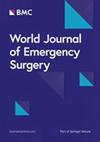低分子量肝素治疗急性胰腺炎的有效性和安全性:系统回顾和荟萃分析
IF 5.8
1区 医学
Q1 EMERGENCY MEDICINE
引用次数: 0
摘要
最近的研究表明,低分子量肝素(LMWH)可减轻急性胰腺炎(AP)的严重程度。本系统综述和荟萃分析旨在综合现有证据,说明 LMWH 治疗中度和重度急性胰腺炎的有效性和安全性。本系统综述和荟萃分析是根据《PRISMA 指南》2020 年更新版和《干预措施系统综述 Cochrane 手册》进行的。系统性检索在 MEDLINE、Cochrane 对照试验中央注册中心、Scopus 和 EMBASE 中进行,涵盖截至 2024 年 2 月发表的研究。符合条件的研究包括随机对照试验(RCT)和观察性研究(n-RCT),这些研究报告了在标准治疗(干预)的基础上接受 LMWH 治疗的患者与接受标准治疗但不接受 LMWH 治疗的患者(对照)在 AP 治疗结果上的差异。采用随机效应模型计算汇总相对风险 (RR) 和平均差异 (MD) 以及相应的 95% CI。荟萃分析共纳入了 13 项研究,这些研究均发表于 2004 年至 2022 年之间。其中八项为 RCT 研究,五项为 n-RCT 研究。分析了 13709 名患者(6971 名干预组和 6738 名对照组)的数据。干预组和对照组的比较显示,在总死亡率(RR = 0.44,95% CI = 0.31; 0.64,P < 0.0001,I2 = 51%)、急性坏死集结(RR = 0.24,95% CI = 0.09; 0.62,P = 0.003,I2 = 0%)和器官衰竭(RR = 0.67,95% CI = 0.48; 0.93,P = 0.02,I2 = 78%)方面,LMWH优于标准治疗。与对照组相比,干预组在胃肠道出血(RR = 0.64,95% CI = 0.44; 0.94,P = 0.02,I2 = 0%)、住院时间(MD= - 6.08,95% CI = - 10.08; - 2.07,P = 0.003,I2 = 98%)、手术干预需求(RR = 0.50,95% CI = 0.29; 0.87,P = 0.01,I2 = 61%)和血管血栓形成(RR = 0.43,95% CI = 0.31; 0.61,P < 0.00001,I2 = 0%)。中度至高质量证据表明,早期使用 LMWH 干预可改善非轻度 AP 的预后,降低死亡率、器官衰竭和血管血栓形成的发生率。鉴于我们的研究结果,建议将 LMWH 纳入中重度至重度 AP 的治疗方案中。本文章由计算机程序翻译,如有差异,请以英文原文为准。
Effectiveness and safety of low molecular weight heparin in the management of acute pancreatitis: a systematic review and meta-analysis
Recent studies suggest that low-molecular-weight heparin (LMWH) may play a role in mitigating the severity of acute pancreatitis (AP). This systematic review and meta-analysis aims to synthesise existing evidence on the effectiveness and safety of LMWH in the treatment of moderately-severe and severe AP. This systematic review and meta-analysis was conducted in accordance with the 2020 update of the PRISMA guidelines and the Cochrane Handbook for Systematic Reviews of Interventions. The systematic search was conducted in MEDLINE, the Cochrane Central Register of Controlled Trials, Scopus, and EMBASE, covering studies published up to February 2024. Randomised controlled trials (RCTs) and observational studies (n-RCTs) that reported the differences in the outcomes of AP for patients receiving LMWH in addition to the standard treatment (Intervention), compared to patients managed by standard treatment without LMWH (Control) were eligible. A random-effects model was used to calculate the pooled relative risk (RR) and mean differences (MD) with the corresponding 95% CI. Thirteen studies were included in the meta-analysis, all published between 2004 and 2022. Eight studies were RCTs, and five were n-RCTs. Data from 13,709 patients (6.971 Interventions and 6.738 Controls) were analysed. The comparison of Intervention and Control groups showed the superiority of LMWH to standard treatments in terms of overall mortality (RR = 0.44, 95% CI = 0.31; 0.64, P < 0.0001, I2 = 51%), acute necrotic collections (RR = 0.24, 95% CI = 0.09; 0.62, P = 0.003, I2 = 0%), and organ failure (RR = 0.67, 95% CI = 0.48; 0.93, P = 0.02, I2 = 78%). The Intervention group showed superior outcomes compared with the Control group for gastrointestinal bleeding (RR = 0.64, 95% CI = 0.44; 0.94, P = 0.02, I2 = 0%), length of hospital stay (MD= − 6.08, 95% CI = − 10.08; − 2.07, P = 0.003, I2 = 98%), need for operative interventions (RR = 0.50, 95% CI = 0.29; 0.87, P = 0.01, I2 = 61%), and vascular thrombosis (RR = 0.43, 95% CI = 0.31; 0.61, P < 0.00001, I2 = 0%). Moderate to high-quality evidence suggests that early intervention with LMWH could improve the prognosis of non-mild AP in terms of mortality, organ failure, and decreased incidence of vascular thrombosis. In light of our findings, integrating LMWH into the treatment regimen for moderate-severe to severe AP is advocated.
求助全文
通过发布文献求助,成功后即可免费获取论文全文。
去求助
来源期刊

World Journal of Emergency Surgery
EMERGENCY MEDICINE-SURGERY
CiteScore
14.50
自引率
5.00%
发文量
60
审稿时长
10 weeks
期刊介绍:
The World Journal of Emergency Surgery is an open access, peer-reviewed journal covering all facets of clinical and basic research in traumatic and non-traumatic emergency surgery and related fields. Topics include emergency surgery, acute care surgery, trauma surgery, intensive care, trauma management, and resuscitation, among others.
 求助内容:
求助内容: 应助结果提醒方式:
应助结果提醒方式:


